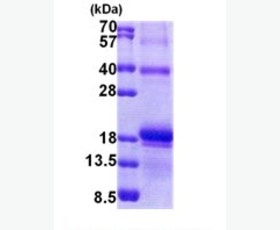Recombinant Mouse Cathepsin H/CTSH
| Product name: | Recombinant Mouse Cathepsin H/CTSH |
| Source: | Human Cells |
| Purity: | Greater than 95% as determined by reducing SDS-PAGE. |
| Buffer Formulation: | Lyophilized from a 0.2 μm filtered solution of 20mM PB, 150mM NaCl, pH7.4. |
| Applications: | Applications:SDS-PAGE; WB; ELISA; IP. |
| Storage: | Avoid repeated freeze/thaw cycles. Store at 2-8 oC for one month. Aliquot and store at -80 oC for 12 months. |
| UOM: | 100ug/50ug/200ug/1mg/1g |
| Source | Human Cells |
| Description | Recombinant Mouse Cathepsin H is produced by our Mammalian expression system and the target gene encoding Glu22-Val333 is expressed with a 6His tag at the C-terminus. |
| Names | Pro-cathepsin H, CTSH, ACC-4, ACC-5, aleurain, cathepsin B3, cathepsin BA, cathepsin H, CPSB, minichain, N-benzoylarginine-beta-naphthylamide hydrolase |
| Accession # | Q3UCD6 |
| Formulation | Lyophilized from a 0.2 μm filtered solution of 20mM PB, 150mM NaCl, pH7.4. |
| Shipping |
The product is shipped at ambient temperature. |
| Reconstitution |
Always centrifuge tubes before opening. Do not mix by vortex or pipetting. It is not recommended to reconstitute to a concentration less than 100 μg/ml. Dissolve the lyophilized protein in ddH2O. Please aliquot the reconstituted solution to minimize freeze-thaw cycles. |
| Storage |
Lyophilized protein should be stored at < -20°C, though stable at room temperature for 3 weeks. Reconstituted protein solution can be stored at 4-7°C for 2-7 days. Aliquots of reconstituted samples are stable at < -20°C for 3 months. |
| Purity |
Greater than 95% as determined by reducing SDS-PAGE. |
| Endotoxin | Less than 0.1 ng/µg (1 IEU/µg) as determined by LAL test. |
| Amino Acid Sequence |
ELTVNAIEKFHFKSWMKQHQKTYSSVEYNHRLQMFANNWRKIQAHNQRNHTFKMALNQFSDMSFA EIKHKFLWSEPQNCSATKSNYLRGTGPYPSSMDWRKKGNVVSPVKNQGACASCWTFSTTGALESA VAIASGKMLSLAEQQLVDCAQAFNNHGCKGGLPSQAFEYILYNKGIMEEDSYPYIGKDSSCRFNP QKAVAFVKNVVNITLNDEAAMVEAVALYNPVSFAFEVTEDFLMYKSGVYSSKSCHKTPDKVNHAV LAVGYGEQNGLLYWIVKNSWGSQWGENGYFLIERGKNMCGLAACASYPIPQVVDHHHHHH
|
| Background | Cathepsin H (CTSH), which can act both as an aminopeptidase and as an endopeptidase, is a lysosomal cysteine protease of the papain family. CTSH is composed of a dimer of disulfide-linked heavy and light chains, both produced from a single protein precursor. CTSH is associated with various pathological conditions like human fibrous meningioma, colorectal cancer, arthritis, human prostate tumor and lung cancer. CTSH is associated with cancer progression because of their ability to degrade extracellular matrices facilitating invasion, angiogenesis and metastasis as is evident from numerous clinical reports and experimental models. The expression of CTSH is significantly increased in disease states such as in prostate tumors, sera of asthmatic patients, and mucosa of colorectal cancer patients. |














